人教新目标版英语八年级上册 Unit 1 Where did you go on vacation导学案
文档属性
| 名称 | 人教新目标版英语八年级上册 Unit 1 Where did you go on vacation导学案 | 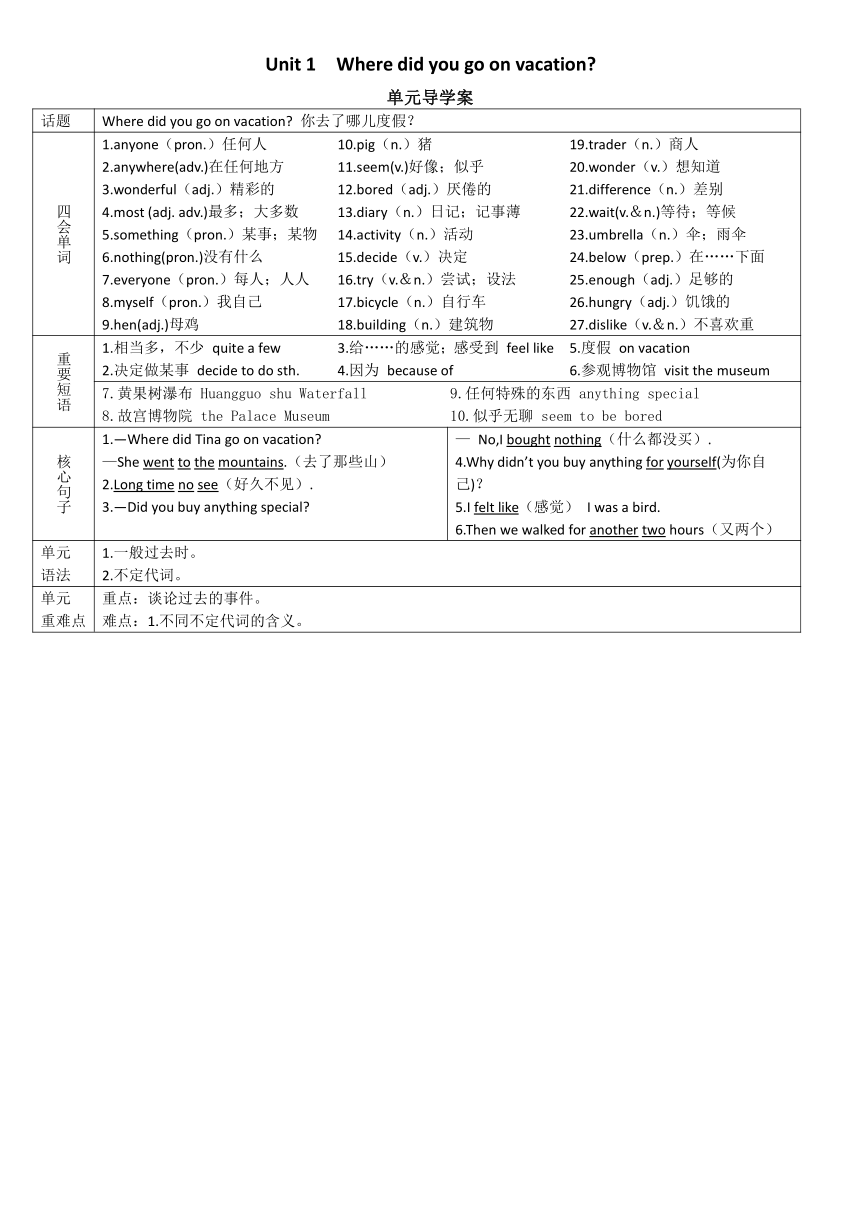 | |
| 格式 | doc | ||
| 文件大小 | 111.8KB | ||
| 资源类型 | 教案 | ||
| 版本资源 | 人教新目标(Go for it)版 | ||
| 科目 | 英语 | ||
| 更新时间 | 2023-07-04 18:28:23 | ||
图片预览

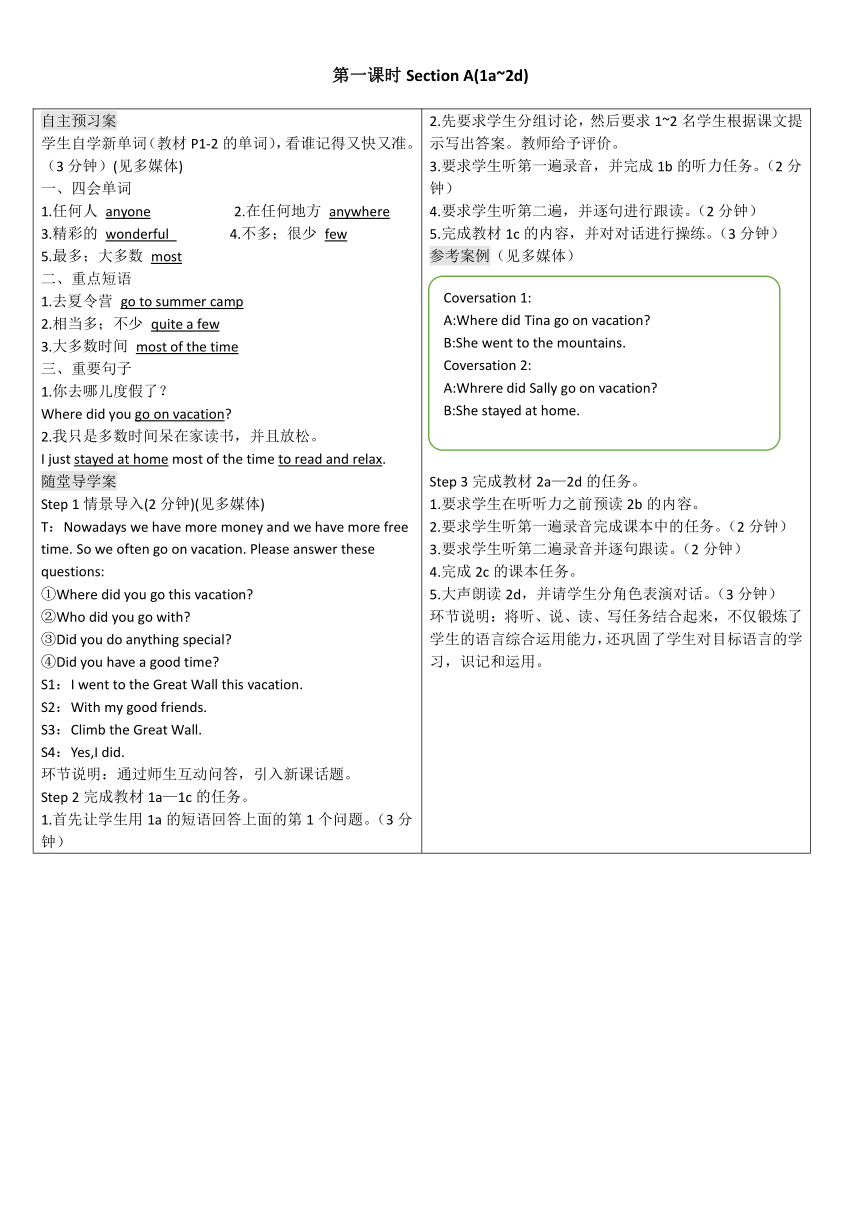
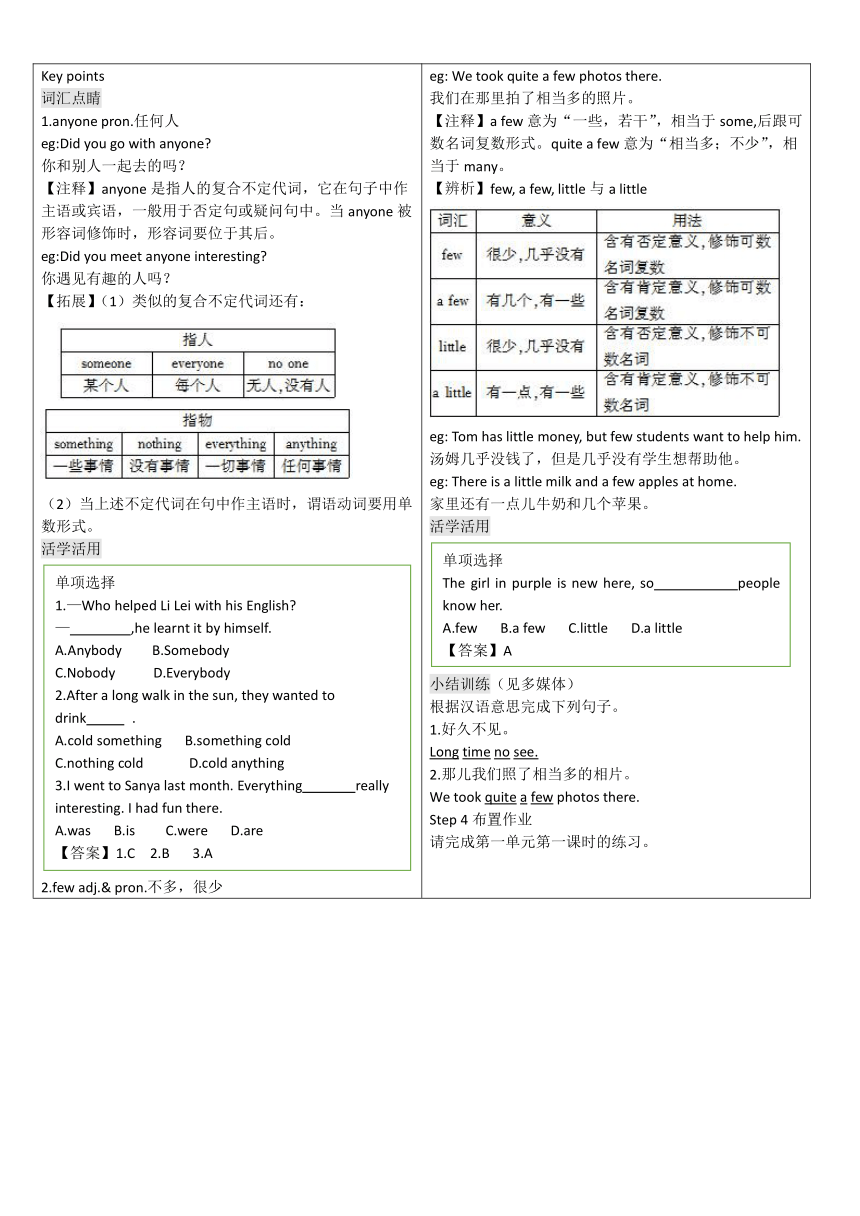
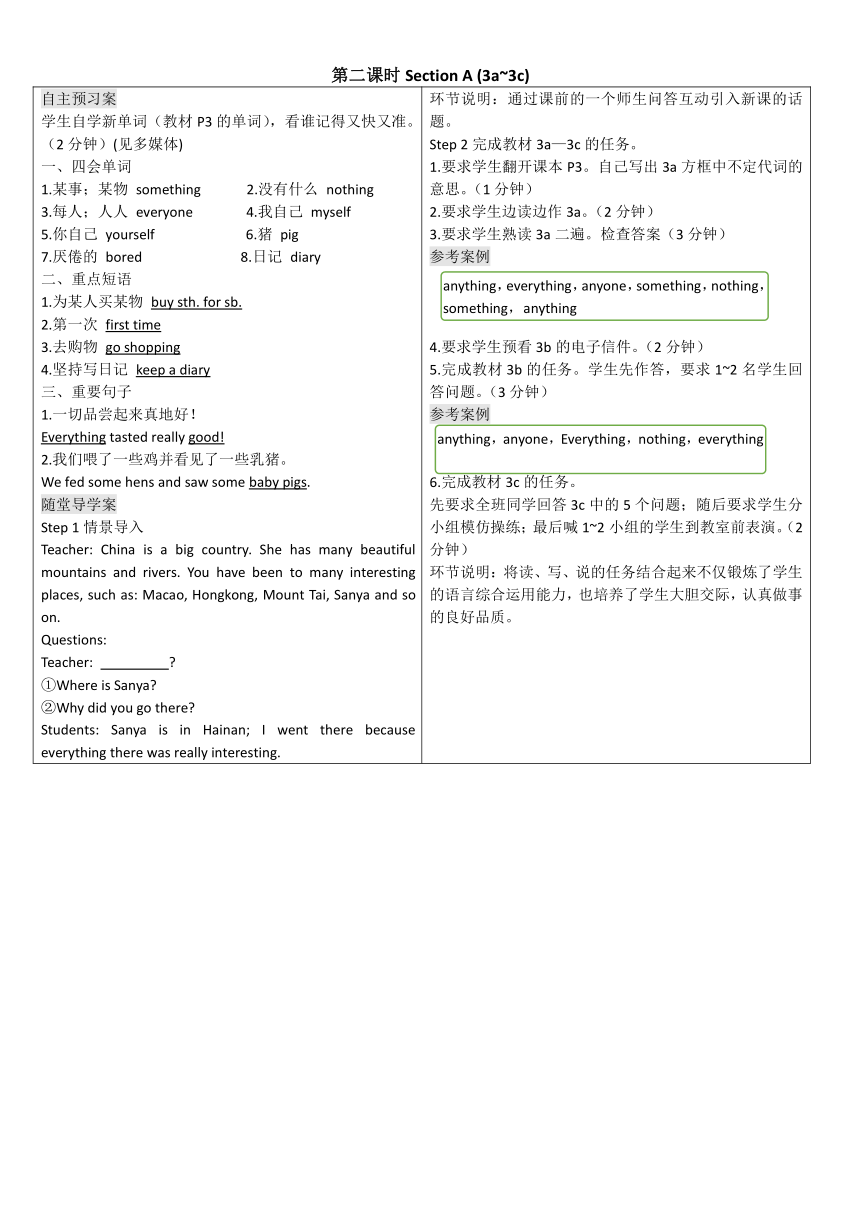
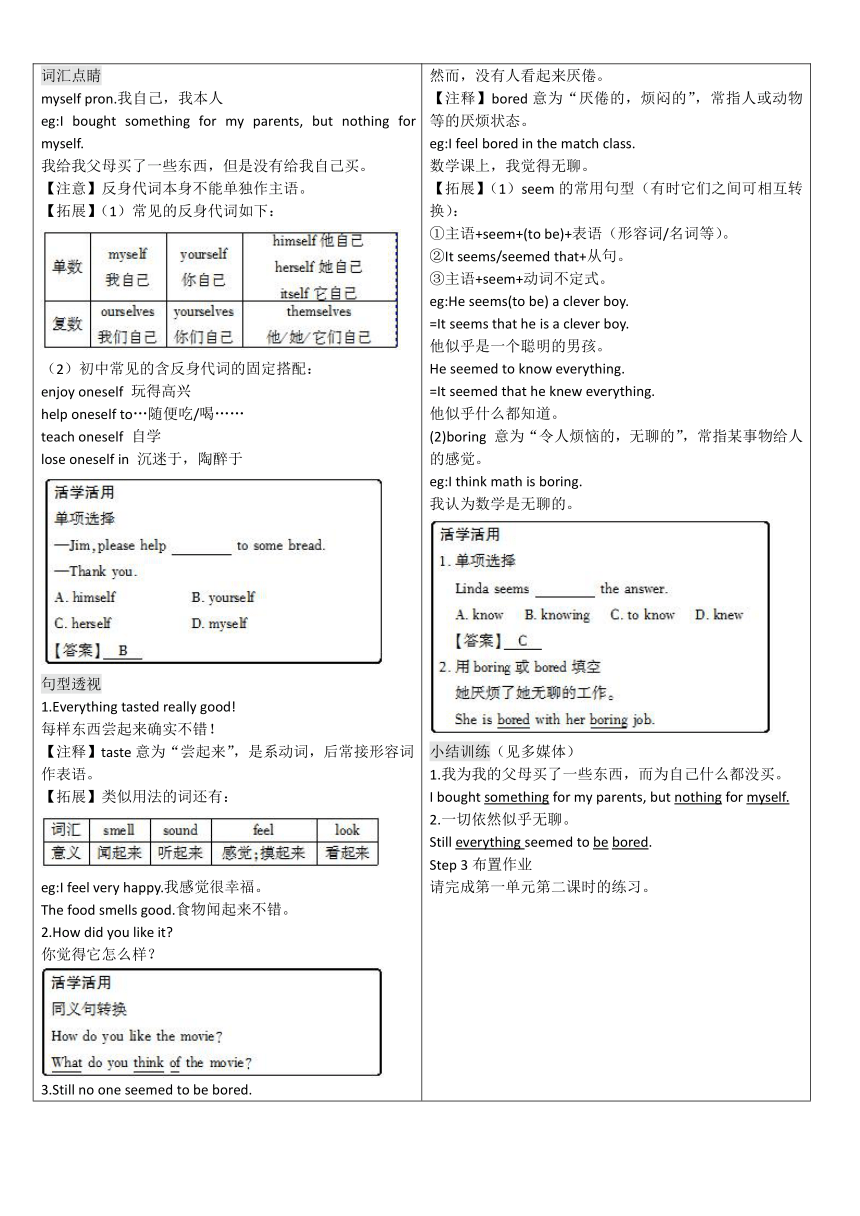
文档简介
Unit 1 Where did you go on vacation
单元导学案
话题 Where did you go on vacation 你去了哪儿度假?
四会单词 1.anyone(pron.)任何人 2.anywhere(adv.)在任何地方 3.wonderful(adj.)精彩的 4.most (adj. adv.)最多;大多数 5.something(pron.)某事;某物 6.nothing(pron.)没有什么 7.everyone(pron.)每人;人人 8.myself(pron.)我自己 9.hen(adj.)母鸡 10.pig(n.)猪 11.seem(v.)好像;似乎 12.bored(adj.)厌倦的 13.diary(n.)日记;记事薄 14.activity(n.)活动 15.decide(v.)决定 16.try(v.&n.)尝试;设法 17.bicycle(n.)自行车 18.building(n.)建筑物 19.trader(n.)商人 20.wonder(v.)想知道 21.difference(n.)差别 22.wait(v.&n.)等待;等候 23.umbrella(n.)伞;雨伞 24.below(prep.)在……下面 25.enough(adj.)足够的 26.hungry(adj.)饥饿的 27.dislike(v.&n.)不喜欢重
重要短语 1.相当多,不少 quite a few 2.决定做某事 decide to do sth. 3.给……的感觉;感受到 feel like 4.因为 because of 5.度假 on vacation 6.参观博物馆 visit the museum
7.黄果树瀑布 Huangguo shu Waterfall 8.故宫博物院 the Palace Museum 9.任何特殊的东西 anything special 10.似乎无聊 seem to be bored
核心句子 1.—Where did Tina go on vacation —She went to the mountains.(去了那些山) 2.Long time no see(好久不见). 3.—Did you buy anything special — No,I bought nothing(什么都没买). 4.Why didn’t you buy anything for yourself(为你自己)? 5.I felt like(感觉) I was a bird. 6.Then we walked for another two hours(又两个)
单元 语法 1.一般过去时。 2.不定代词。
单元 重难点 重点:谈论过去的事件。 难点:1.不同不定代词的含义。
第一课时Section A(1a~2d)
自主预习案 学生自学新单词(教材P1-2的单词),看谁记得又快又准。(3分钟)(见多媒体) 一、四会单词 1.任何人 anyone 2.在任何地方 anywhere 3.精彩的 wonderful 4.不多;很少 few 5.最多;大多数 most 二、重点短语 1.去夏令营 go to summer camp 2.相当多;不少 quite a few 3.大多数时间 most of the time 三、重要句子 1.你去哪儿度假了? Where did you go on vacation 2.我只是多数时间呆在家读书,并且放松。 I just stayed at home most of the time to read and relax. 随堂导学案 Step 1情景导入(2分钟)(见多媒体) T:Nowadays we have more money and we have more free time. So we often go on vacation. Please answer these questions: ①Where did you go this vacation ②Who did you go with ③Did you do anything special ④Did you have a good time S1:I went to the Great Wall this vacation. S2:With my good friends. S3:Climb the Great Wall. S4:Yes,I did. 环节说明:通过师生互动问答,引入新课话题。 Step 2完成教材1a—1c的任务。 1.首先让学生用1a的短语回答上面的第1个问题。(3分钟) 2.先要求学生分组讨论,然后要求1~2名学生根据课文提示写出答案。教师给予评价。 3.要求学生听第一遍录音,并完成1b的听力任务。(2分钟) 4.要求学生听第二遍,并逐句进行跟读。(2分钟) 5.完成教材1c的内容,并对对话进行操练。(3分钟) 参考案例(见多媒体) (
Coversation 1:
A:Where did Tina go on vacation
B:She went to the mountains.
Coversation 2:
A:Whrere did Sally go on vacation
B:She stayed at home.
) Step 3完成教材2a—2d的任务。 1.要求学生在听听力之前预读2b的内容。 2.要求学生听第一遍录音完成课本中的任务。(2分钟) 3.要求学生听第二遍录音并逐句跟读。(2分钟) 4.完成2c的课本任务。 5.大声朗读2d,并请学生分角色表演对话。(3分钟) 环节说明:将听、说、读、写任务结合起来,不仅锻炼了学生的语言综合运用能力,还巩固了学生对目标语言的学习,识记和运用。
Key points 词汇点睛 1.anyone pron.任何人 eg:Did you go with anyone 你和别人一起去的吗? 【注释】anyone是指人的复合不定代词,它在句子中作主语或宾语,一般用于否定句或疑问句中。当anyone被形容词修饰时,形容词要位于其后。 eg:Did you meet anyone interesting 你遇见有趣的人吗? 【拓展】(1)类似的复合不定代词还有: (2)当上述不定代词在句中作主语时,谓语动词要用单数形式。 活学活用 (
单项选择
1.
—
Who helped Li Lei with his English
—
,he learnt it by himself.
A.Anybody
B.Somebody
C.Nobody
D.Everybody
2.After a long walk in the sun,
they wanted to drink
.
A.cold something
B.something cold
C.nothing cold
D.cold anything
3.I went to Sanya last month.
Everything
really interesting.
I had fun there.
A.was
B.is
C.were
D.are
【答案】
1.C
2.B
3.A
) 2.few adj.& pron.不多,很少 eg: We took quite a few photos there. 我们在那里拍了相当多的照片。 【注释】a few意为“一些,若干”,相当于some,后跟可数名词复数形式。quite a few意为“相当多;不少”,相当于many。 【辨析】few, a few, little与a little eg: Tom has little money, but few students want to help him. 汤姆几乎没钱了,但是几乎没有学生想帮助他。 eg: There is a little milk and a few apples at home. 家里还有一点儿牛奶和几个苹果。 活学活用 (
单项选择
The girl in purple is new here,
so
people know her.
A.few
B.a few
C.little
D.a little
【答案】
A
) 小结训练(见多媒体) 根据汉语意思完成下列句子。 1.好久不见。 Long time no see. 2.那儿我们照了相当多的相片。 We took quite a few photos there. Step 4布置作业 请完成第一单元第一课时的练习。
第二课时Section A (3a~3c)
自主预习案 学生自学新单词(教材P3的单词),看谁记得又快又准。(2分钟)(见多媒体) 一、四会单词 1.某事;某物 something 2.没有什么 nothing 3.每人;人人 everyone 4.我自己 myself 5.你自己 yourself 6.猪 pig 7.厌倦的 bored 8.日记 diary 二、重点短语 1.为某人买某物 buy sth. for sb. 2.第一次 first time 3.去购物 go shopping 4.坚持写日记 keep a diary 三、重要句子 1.一切品尝起来真地好! Everything tasted really good! 2.我们喂了一些鸡并看见了一些乳猪。 We fed some hens and saw some baby pigs. 随堂导学案 Step 1情景导入 Teacher: China is a big country. She has many beautiful mountains and rivers. You have been to many interesting places, such as: Macao, Hongkong, Mount Tai, Sanya and so on. Questions: Teacher: ①Where is Sanya ②Why did you go there Students: Sanya is in Hainan; I went there because everything there was really interesting. 环节说明:通过课前的一个师生问答互动引入新课的话题。 Step 2完成教材3a—3c的任务。 1.要求学生翻开课本P3。自己写出3a方框中不定代词的意思。(1分钟) 2.要求学生边读边作3a。(2分钟) 3.要求学生熟读3a二遍。检查答案(3分钟) 参考案例 (
anything
,
everything
,
anyone
,
something
,
nothing
,
something
,
anything
) 4.要求学生预看3b的电子信件。(2分钟) 5.完成教材3b的任务。学生先作答,要求1~2名学生回答问题。(3分钟) (
anything
,
anyone
,
Everything
,
nothing
,
everything
)参考案例 6.完成教材3c的任务。 先要求全班同学回答3c中的5个问题;随后要求学生分小组模仿操练;最后喊1~2小组的学生到教室前表演。(2分钟) 环节说明:将读、写、说的任务结合起来不仅锻炼了学生的语言综合运用能力,也培养了学生大胆交际,认真做事的良好品质。
词汇点睛 myself pron.我自己,我本人 eg:I bought something for my parents, but nothing for myself. 我给我父母买了一些东西,但是没有给我自己买。 【注意】反身代词本身不能单独作主语。 【拓展】(1)常见的反身代词如下: (2)初中常见的含反身代词的固定搭配: enjoy oneself 玩得高兴 help oneself to…随便吃/喝…… teach oneself 自学 lose oneself in 沉迷于,陶醉于 句型透视 1.Everything tasted really good! 每样东西尝起来确实不错! 【注释】taste意为“尝起来”,是系动词,后常接形容词作表语。 【拓展】类似用法的词还有: eg:I feel very happy.我感觉很幸福。 The food smells good.食物闻起来不错。 2.How did you like it 你觉得它怎么样? 3.Still no one seemed to be bored. 然而,没有人看起来厌倦。 【注释】bored意为“厌倦的,烦闷的”,常指人或动物等的厌烦状态。 eg:I feel bored in the match class. 数学课上,我觉得无聊。 【拓展】(1)seem的常用句型(有时它们之间可相互转换): ①主语+seem+(to be)+表语(形容词/名词等)。 ②It seems/seemed that+从句。 ③主语+seem+动词不定式。 eg:He seems(to be) a clever boy. =It seems that he is a clever boy. 他似乎是一个聪明的男孩。 He seemed to know everything. =It seemed that he knew everything. 他似乎什么都知道。 (2)boring 意为“令人烦恼的,无聊的”,常指某事物给人的感觉。 eg:I think math is boring. 我认为数学是无聊的。 小结训练(见多媒体) 1.我为我的父母买了一些东西,而为自己什么都没买。 I bought something for my parents, but nothing for myself. 2.一切依然似乎无聊。 Still everything seemed to be bored. Step 3布置作业 请完成第一单元第二课时的练习。
第三课时单元语法精讲与精练
(见P4)
第四课时Section B (1a~1e)
自主预习案 学生自学新单词(教材P4的单词),看谁记得又快又准。(3分钟)(见多媒体) 一、四会单词 1.可口的 delicious 2.可怕的 terrible 3.昂贵的 expensive 4.便宜的 cheap 5.令人激动的 exciting 二、重点短语 1.干任何特别的事情do anything special 2.为她的最好朋友for her best friend 3.有趣的公园the fun park 三、重要句子 1.她去了香港。 She went to Hong Kong. 2.Lisa喜欢她的假期吗? Did Lisa like her vacation 3.那儿食品怎样? How was the food 随堂导学案 Step 1情景导入 Teacher:向学生展示去年暑假我们游九寨沟的一些图片。然后向学生描述:(见多媒体) I went to Jiuzhaigou last vacation. I think the people there were friendly, the food was delicious and it was very beautiful. Questions: ①Where did you go last vacation ②What did you do there ③Did you like your vacation Answers: S1:I went to HongKong. S2:Shopping. S3:Yes,I did. 环节说明:借助真实图片导入,可以有效吸引学生的注意力。 Step 2完成教材1a—1b的任务。 1.要求学生熟读1a的单词,并认真地予以配对。(1分钟) 2.教师走动检查,帮助学生。(3分钟) 参考案例 (
1.f 3.c 5.b
2.a 4.e 6.d
) 3.再看一遍1a的单词,并将1a单词按积极单词与消极单词予以分类。(见多媒体) 操作案例 (
delicious terrible
exciting boring
cheap expensive
) Step 3完成教材1c—1e的任务。 1.听之前,预习1c的内容。可知这是一篇关于Lisa去香港度假的文章。(1分钟) 2.听第二遍,回答1c的4个问题。(3分钟) 3.听第三遍,完成1d。(2分钟) 4.根据听的内容进行问与答,完成1e的任务。 环节说明:反复多听及带着问题去听有利于提高听力效果及培养学生的信心。 小结训练 根据文中内容选择答案(见多媒体) 1.How was Lisa’s vacation (exciting, boring) 2.How was the food (delicious, terrible) 3.How was the souvenir (expensive, cheap) Step 4布置作业 请完成第一单元第四课时的练习。
第五课时Section B (2a~4))
自主预习案 学生自学新单词(教材P5-7的单词),看谁记得又快又准。(3分钟)(见多媒体) 一、四会单词 1.决定;选定 decide 2.自行车 bicycle 3.商人 trader 4.想知道 wonder 5.差别;差异 difference 6.伞;雨伞 umbrella 7.足够的 enough 8.不喜爱 dislike 二、重点短语 1.给……的感觉;感受到 feel like 2.因为 because of 3.决定做某事 decide to do sth. 4.对……有作用(影响) make a difference 5.另外两个 another two 三、重要句子 1.你发现哪些活动是令人愉快的? What activities do you find enjoyable 2.我想知道这里的生活过去是怎样的? I wonder what life was like here in the past. 随堂导学案 Step 1情景导入(2分钟) Teacher: Show some pictures about Mark’s vacation and retell it. Mark went to a friend’s farm in the countryside with his family. Everything was great. They fed some hens and saw some baby pigs. They were so cute! The only problem was that there was nothing much to do in the evening,it seemed to be bored. What about Jane’s vacation, do you know 环节说明:通过图片及用自己的语言复述内容能有效学到英语知识。并通过设问方式导入,能有效引人入胜。 Step 2完成教材2a—2e的任务。 1.预读 (1)预读2a的两个问题。(1分钟) (2)要求学生快速阅读2b短文并回答2a的问题。以及下列2个问题: a. Did Jane have a good time on Monday b. What about on Tuesday 2.学生朗读2b短文。(2分钟) 3.完成2c的表格。 4.完成2e的填空。 参考案例 (
was,
went,
walked,
started,
saw,
stopped,
drank,
walked,
got,
was,
looked
) 环节说明:让学生带着问题及要求能使阅读有的放矢,高效,有目的。 Step 3完成教材3a—4的任务。 1.完成3a的填词。 2.学生小组活动完成3b的内容。 3.要求学生写一篇文章(a travel diary). 4.想象你与一位外国人交谈你的一次假期。
词汇点睛 1.decide v.决定,选定 eg:It was sunny and hot,so we decided to go to the beach near our hotel. 天气晴朗、炎热,因此我们决定去我们住的宾馆附近的海滩。 【注释】decide to do sth.意为“决定做某事”。 【拓展】decide的名词形式是decision,意为“决定”,常构成短语make a decision,意为“做决定”。 2.try v.& n.尝试,设法,努力 eg:My sister and I tried paragliding. 我和我姐姐尝试了滑翔伞运动。 I will try my best to help you. 我会尽我最大的努力帮助你。 I tried to get there on time,but I couldn?t. 我设法按时到达那里,但却没能。 Who can have a try 谁可以试一下? 【注释】根据上述例句归纳短语用法: (1)try doing sth尝试做某事 (2)try one’s best to do sth尽某人最大努力做某事 (3)try to do sth努力/尽力做某事 (4)have a try试一试(此处try是名词) 3.wonder v.想知道,琢磨 eg:I wonder what life was like here in the past. 我想知道过去这儿的生活是什么样的。 The Great Wall is a wonder in the world. 长城是世界上的一个奇迹。 【注释】(1)wonder意为“想知道”,相当于“want to know”。wonder后的宾语从句要用陈述语序。 (2)wonder还可作名词,意为“奇迹”。 4.enough adj.& adv.足够的(地);充足的(地) eg: My father didn’t bring enough money. 我爸爸没有带足够的钱。 The job is not easy enough for me. 这份工作对我来说不是那么容易(能够胜任的)。 He does his homework carefully enough. 他做作业足够认真。 【注释】(1)enough作形容词时,既可修饰可数名词,又可修饰不可数名词,一般放在名词前。 (2)enough作副词,修饰形容词或副词时,放在其后。
句型透视 1.What a difference a day makes! 一天的差异是多么大呀! 【注释】这是一个感叹句。此句的中心词是名词“a difference”,故句首应用感叹词what。 【拓展】若感叹句的中心词是形容词或副词,则感叹词应用how。 eg:How clever the girl is!这个女孩多聪明啊! How fast Jim is running!吉姆跑得多快啊! 2.And because of the bad weather, we couldn’t see anything below. 由于天气不好,我们看不清下面的任何东西。 【注释】(1)because of意为“因为,由于”,它是介词短语,后可跟名词、代词或动名词形式。because意为“因为”,后面跟句子,构成原因状语从句。 eg:He didn’t go to school because he was ill. =He didn’t go to school because of his illness. 他因为生病而没有去上学。 (2)below意为“在……下面”。 eg: Please do not write below this line. 请不要在这条线下面写。 【辨析】below与under below指某物处于较低的地方,但不一定是正下方;under指处于某物的正下方。 eg: He dived below the surface of the water. 他潜入了水中。 The boy stood under the tree. 那个男孩站在了树下。 3. My classmates told me to keep going, so I went on. 我的同学们告诉我继续走,所以我坚持了下去。 【注释】(1)句中told是tell的过去式,在句中构成短语tell sb to do sth,意为“告诉某人做某事”;其否定结构为tell sb not to do sth。 (2)Keep doing sth意为“继续/反复做某事”。 【拓展】固定搭配: 讲笑话tell a joke撒谎tell a lie 说实话tell the truth讲故事tell a story 记日记keep a diary保持安静keep quiet 信守诺言keep one’s word 记住某事keep sth in one’s mind 小结训练 根据汉语提示,完成句子。(见多媒体) 1.一天的差异是多么大呀! What a difference a day makes! 2.并且因为糟糕的天气,底下的东西我们什么都看不到。 And because of the bad weather, we couldn’t see anything below. Step 4布置作业 请完成第一单元第五课时的练习。
单元导学案
话题 Where did you go on vacation 你去了哪儿度假?
四会单词 1.anyone(pron.)任何人 2.anywhere(adv.)在任何地方 3.wonderful(adj.)精彩的 4.most (adj. adv.)最多;大多数 5.something(pron.)某事;某物 6.nothing(pron.)没有什么 7.everyone(pron.)每人;人人 8.myself(pron.)我自己 9.hen(adj.)母鸡 10.pig(n.)猪 11.seem(v.)好像;似乎 12.bored(adj.)厌倦的 13.diary(n.)日记;记事薄 14.activity(n.)活动 15.decide(v.)决定 16.try(v.&n.)尝试;设法 17.bicycle(n.)自行车 18.building(n.)建筑物 19.trader(n.)商人 20.wonder(v.)想知道 21.difference(n.)差别 22.wait(v.&n.)等待;等候 23.umbrella(n.)伞;雨伞 24.below(prep.)在……下面 25.enough(adj.)足够的 26.hungry(adj.)饥饿的 27.dislike(v.&n.)不喜欢重
重要短语 1.相当多,不少 quite a few 2.决定做某事 decide to do sth. 3.给……的感觉;感受到 feel like 4.因为 because of 5.度假 on vacation 6.参观博物馆 visit the museum
7.黄果树瀑布 Huangguo shu Waterfall 8.故宫博物院 the Palace Museum 9.任何特殊的东西 anything special 10.似乎无聊 seem to be bored
核心句子 1.—Where did Tina go on vacation —She went to the mountains.(去了那些山) 2.Long time no see(好久不见). 3.—Did you buy anything special — No,I bought nothing(什么都没买). 4.Why didn’t you buy anything for yourself(为你自己)? 5.I felt like(感觉) I was a bird. 6.Then we walked for another two hours(又两个)
单元 语法 1.一般过去时。 2.不定代词。
单元 重难点 重点:谈论过去的事件。 难点:1.不同不定代词的含义。
第一课时Section A(1a~2d)
自主预习案 学生自学新单词(教材P1-2的单词),看谁记得又快又准。(3分钟)(见多媒体) 一、四会单词 1.任何人 anyone 2.在任何地方 anywhere 3.精彩的 wonderful 4.不多;很少 few 5.最多;大多数 most 二、重点短语 1.去夏令营 go to summer camp 2.相当多;不少 quite a few 3.大多数时间 most of the time 三、重要句子 1.你去哪儿度假了? Where did you go on vacation 2.我只是多数时间呆在家读书,并且放松。 I just stayed at home most of the time to read and relax. 随堂导学案 Step 1情景导入(2分钟)(见多媒体) T:Nowadays we have more money and we have more free time. So we often go on vacation. Please answer these questions: ①Where did you go this vacation ②Who did you go with ③Did you do anything special ④Did you have a good time S1:I went to the Great Wall this vacation. S2:With my good friends. S3:Climb the Great Wall. S4:Yes,I did. 环节说明:通过师生互动问答,引入新课话题。 Step 2完成教材1a—1c的任务。 1.首先让学生用1a的短语回答上面的第1个问题。(3分钟) 2.先要求学生分组讨论,然后要求1~2名学生根据课文提示写出答案。教师给予评价。 3.要求学生听第一遍录音,并完成1b的听力任务。(2分钟) 4.要求学生听第二遍,并逐句进行跟读。(2分钟) 5.完成教材1c的内容,并对对话进行操练。(3分钟) 参考案例(见多媒体) (
Coversation 1:
A:Where did Tina go on vacation
B:She went to the mountains.
Coversation 2:
A:Whrere did Sally go on vacation
B:She stayed at home.
) Step 3完成教材2a—2d的任务。 1.要求学生在听听力之前预读2b的内容。 2.要求学生听第一遍录音完成课本中的任务。(2分钟) 3.要求学生听第二遍录音并逐句跟读。(2分钟) 4.完成2c的课本任务。 5.大声朗读2d,并请学生分角色表演对话。(3分钟) 环节说明:将听、说、读、写任务结合起来,不仅锻炼了学生的语言综合运用能力,还巩固了学生对目标语言的学习,识记和运用。
Key points 词汇点睛 1.anyone pron.任何人 eg:Did you go with anyone 你和别人一起去的吗? 【注释】anyone是指人的复合不定代词,它在句子中作主语或宾语,一般用于否定句或疑问句中。当anyone被形容词修饰时,形容词要位于其后。 eg:Did you meet anyone interesting 你遇见有趣的人吗? 【拓展】(1)类似的复合不定代词还有: (2)当上述不定代词在句中作主语时,谓语动词要用单数形式。 活学活用 (
单项选择
1.
—
Who helped Li Lei with his English
—
,he learnt it by himself.
A.Anybody
B.Somebody
C.Nobody
D.Everybody
2.After a long walk in the sun,
they wanted to drink
.
A.cold something
B.something cold
C.nothing cold
D.cold anything
3.I went to Sanya last month.
Everything
really interesting.
I had fun there.
A.was
B.is
C.were
D.are
【答案】
1.C
2.B
3.A
) 2.few adj.& pron.不多,很少 eg: We took quite a few photos there. 我们在那里拍了相当多的照片。 【注释】a few意为“一些,若干”,相当于some,后跟可数名词复数形式。quite a few意为“相当多;不少”,相当于many。 【辨析】few, a few, little与a little eg: Tom has little money, but few students want to help him. 汤姆几乎没钱了,但是几乎没有学生想帮助他。 eg: There is a little milk and a few apples at home. 家里还有一点儿牛奶和几个苹果。 活学活用 (
单项选择
The girl in purple is new here,
so
people know her.
A.few
B.a few
C.little
D.a little
【答案】
A
) 小结训练(见多媒体) 根据汉语意思完成下列句子。 1.好久不见。 Long time no see. 2.那儿我们照了相当多的相片。 We took quite a few photos there. Step 4布置作业 请完成第一单元第一课时的练习。
第二课时Section A (3a~3c)
自主预习案 学生自学新单词(教材P3的单词),看谁记得又快又准。(2分钟)(见多媒体) 一、四会单词 1.某事;某物 something 2.没有什么 nothing 3.每人;人人 everyone 4.我自己 myself 5.你自己 yourself 6.猪 pig 7.厌倦的 bored 8.日记 diary 二、重点短语 1.为某人买某物 buy sth. for sb. 2.第一次 first time 3.去购物 go shopping 4.坚持写日记 keep a diary 三、重要句子 1.一切品尝起来真地好! Everything tasted really good! 2.我们喂了一些鸡并看见了一些乳猪。 We fed some hens and saw some baby pigs. 随堂导学案 Step 1情景导入 Teacher: China is a big country. She has many beautiful mountains and rivers. You have been to many interesting places, such as: Macao, Hongkong, Mount Tai, Sanya and so on. Questions: Teacher: ①Where is Sanya ②Why did you go there Students: Sanya is in Hainan; I went there because everything there was really interesting. 环节说明:通过课前的一个师生问答互动引入新课的话题。 Step 2完成教材3a—3c的任务。 1.要求学生翻开课本P3。自己写出3a方框中不定代词的意思。(1分钟) 2.要求学生边读边作3a。(2分钟) 3.要求学生熟读3a二遍。检查答案(3分钟) 参考案例 (
anything
,
everything
,
anyone
,
something
,
nothing
,
something
,
anything
) 4.要求学生预看3b的电子信件。(2分钟) 5.完成教材3b的任务。学生先作答,要求1~2名学生回答问题。(3分钟) (
anything
,
anyone
,
Everything
,
nothing
,
everything
)参考案例 6.完成教材3c的任务。 先要求全班同学回答3c中的5个问题;随后要求学生分小组模仿操练;最后喊1~2小组的学生到教室前表演。(2分钟) 环节说明:将读、写、说的任务结合起来不仅锻炼了学生的语言综合运用能力,也培养了学生大胆交际,认真做事的良好品质。
词汇点睛 myself pron.我自己,我本人 eg:I bought something for my parents, but nothing for myself. 我给我父母买了一些东西,但是没有给我自己买。 【注意】反身代词本身不能单独作主语。 【拓展】(1)常见的反身代词如下: (2)初中常见的含反身代词的固定搭配: enjoy oneself 玩得高兴 help oneself to…随便吃/喝…… teach oneself 自学 lose oneself in 沉迷于,陶醉于 句型透视 1.Everything tasted really good! 每样东西尝起来确实不错! 【注释】taste意为“尝起来”,是系动词,后常接形容词作表语。 【拓展】类似用法的词还有: eg:I feel very happy.我感觉很幸福。 The food smells good.食物闻起来不错。 2.How did you like it 你觉得它怎么样? 3.Still no one seemed to be bored. 然而,没有人看起来厌倦。 【注释】bored意为“厌倦的,烦闷的”,常指人或动物等的厌烦状态。 eg:I feel bored in the match class. 数学课上,我觉得无聊。 【拓展】(1)seem的常用句型(有时它们之间可相互转换): ①主语+seem+(to be)+表语(形容词/名词等)。 ②It seems/seemed that+从句。 ③主语+seem+动词不定式。 eg:He seems(to be) a clever boy. =It seems that he is a clever boy. 他似乎是一个聪明的男孩。 He seemed to know everything. =It seemed that he knew everything. 他似乎什么都知道。 (2)boring 意为“令人烦恼的,无聊的”,常指某事物给人的感觉。 eg:I think math is boring. 我认为数学是无聊的。 小结训练(见多媒体) 1.我为我的父母买了一些东西,而为自己什么都没买。 I bought something for my parents, but nothing for myself. 2.一切依然似乎无聊。 Still everything seemed to be bored. Step 3布置作业 请完成第一单元第二课时的练习。
第三课时单元语法精讲与精练
(见P4)
第四课时Section B (1a~1e)
自主预习案 学生自学新单词(教材P4的单词),看谁记得又快又准。(3分钟)(见多媒体) 一、四会单词 1.可口的 delicious 2.可怕的 terrible 3.昂贵的 expensive 4.便宜的 cheap 5.令人激动的 exciting 二、重点短语 1.干任何特别的事情do anything special 2.为她的最好朋友for her best friend 3.有趣的公园the fun park 三、重要句子 1.她去了香港。 She went to Hong Kong. 2.Lisa喜欢她的假期吗? Did Lisa like her vacation 3.那儿食品怎样? How was the food 随堂导学案 Step 1情景导入 Teacher:向学生展示去年暑假我们游九寨沟的一些图片。然后向学生描述:(见多媒体) I went to Jiuzhaigou last vacation. I think the people there were friendly, the food was delicious and it was very beautiful. Questions: ①Where did you go last vacation ②What did you do there ③Did you like your vacation Answers: S1:I went to HongKong. S2:Shopping. S3:Yes,I did. 环节说明:借助真实图片导入,可以有效吸引学生的注意力。 Step 2完成教材1a—1b的任务。 1.要求学生熟读1a的单词,并认真地予以配对。(1分钟) 2.教师走动检查,帮助学生。(3分钟) 参考案例 (
1.f 3.c 5.b
2.a 4.e 6.d
) 3.再看一遍1a的单词,并将1a单词按积极单词与消极单词予以分类。(见多媒体) 操作案例 (
delicious terrible
exciting boring
cheap expensive
) Step 3完成教材1c—1e的任务。 1.听之前,预习1c的内容。可知这是一篇关于Lisa去香港度假的文章。(1分钟) 2.听第二遍,回答1c的4个问题。(3分钟) 3.听第三遍,完成1d。(2分钟) 4.根据听的内容进行问与答,完成1e的任务。 环节说明:反复多听及带着问题去听有利于提高听力效果及培养学生的信心。 小结训练 根据文中内容选择答案(见多媒体) 1.How was Lisa’s vacation (exciting, boring) 2.How was the food (delicious, terrible) 3.How was the souvenir (expensive, cheap) Step 4布置作业 请完成第一单元第四课时的练习。
第五课时Section B (2a~4))
自主预习案 学生自学新单词(教材P5-7的单词),看谁记得又快又准。(3分钟)(见多媒体) 一、四会单词 1.决定;选定 decide 2.自行车 bicycle 3.商人 trader 4.想知道 wonder 5.差别;差异 difference 6.伞;雨伞 umbrella 7.足够的 enough 8.不喜爱 dislike 二、重点短语 1.给……的感觉;感受到 feel like 2.因为 because of 3.决定做某事 decide to do sth. 4.对……有作用(影响) make a difference 5.另外两个 another two 三、重要句子 1.你发现哪些活动是令人愉快的? What activities do you find enjoyable 2.我想知道这里的生活过去是怎样的? I wonder what life was like here in the past. 随堂导学案 Step 1情景导入(2分钟) Teacher: Show some pictures about Mark’s vacation and retell it. Mark went to a friend’s farm in the countryside with his family. Everything was great. They fed some hens and saw some baby pigs. They were so cute! The only problem was that there was nothing much to do in the evening,it seemed to be bored. What about Jane’s vacation, do you know 环节说明:通过图片及用自己的语言复述内容能有效学到英语知识。并通过设问方式导入,能有效引人入胜。 Step 2完成教材2a—2e的任务。 1.预读 (1)预读2a的两个问题。(1分钟) (2)要求学生快速阅读2b短文并回答2a的问题。以及下列2个问题: a. Did Jane have a good time on Monday b. What about on Tuesday 2.学生朗读2b短文。(2分钟) 3.完成2c的表格。 4.完成2e的填空。 参考案例 (
was,
went,
walked,
started,
saw,
stopped,
drank,
walked,
got,
was,
looked
) 环节说明:让学生带着问题及要求能使阅读有的放矢,高效,有目的。 Step 3完成教材3a—4的任务。 1.完成3a的填词。 2.学生小组活动完成3b的内容。 3.要求学生写一篇文章(a travel diary). 4.想象你与一位外国人交谈你的一次假期。
词汇点睛 1.decide v.决定,选定 eg:It was sunny and hot,so we decided to go to the beach near our hotel. 天气晴朗、炎热,因此我们决定去我们住的宾馆附近的海滩。 【注释】decide to do sth.意为“决定做某事”。 【拓展】decide的名词形式是decision,意为“决定”,常构成短语make a decision,意为“做决定”。 2.try v.& n.尝试,设法,努力 eg:My sister and I tried paragliding. 我和我姐姐尝试了滑翔伞运动。 I will try my best to help you. 我会尽我最大的努力帮助你。 I tried to get there on time,but I couldn?t. 我设法按时到达那里,但却没能。 Who can have a try 谁可以试一下? 【注释】根据上述例句归纳短语用法: (1)try doing sth尝试做某事 (2)try one’s best to do sth尽某人最大努力做某事 (3)try to do sth努力/尽力做某事 (4)have a try试一试(此处try是名词) 3.wonder v.想知道,琢磨 eg:I wonder what life was like here in the past. 我想知道过去这儿的生活是什么样的。 The Great Wall is a wonder in the world. 长城是世界上的一个奇迹。 【注释】(1)wonder意为“想知道”,相当于“want to know”。wonder后的宾语从句要用陈述语序。 (2)wonder还可作名词,意为“奇迹”。 4.enough adj.& adv.足够的(地);充足的(地) eg: My father didn’t bring enough money. 我爸爸没有带足够的钱。 The job is not easy enough for me. 这份工作对我来说不是那么容易(能够胜任的)。 He does his homework carefully enough. 他做作业足够认真。 【注释】(1)enough作形容词时,既可修饰可数名词,又可修饰不可数名词,一般放在名词前。 (2)enough作副词,修饰形容词或副词时,放在其后。
句型透视 1.What a difference a day makes! 一天的差异是多么大呀! 【注释】这是一个感叹句。此句的中心词是名词“a difference”,故句首应用感叹词what。 【拓展】若感叹句的中心词是形容词或副词,则感叹词应用how。 eg:How clever the girl is!这个女孩多聪明啊! How fast Jim is running!吉姆跑得多快啊! 2.And because of the bad weather, we couldn’t see anything below. 由于天气不好,我们看不清下面的任何东西。 【注释】(1)because of意为“因为,由于”,它是介词短语,后可跟名词、代词或动名词形式。because意为“因为”,后面跟句子,构成原因状语从句。 eg:He didn’t go to school because he was ill. =He didn’t go to school because of his illness. 他因为生病而没有去上学。 (2)below意为“在……下面”。 eg: Please do not write below this line. 请不要在这条线下面写。 【辨析】below与under below指某物处于较低的地方,但不一定是正下方;under指处于某物的正下方。 eg: He dived below the surface of the water. 他潜入了水中。 The boy stood under the tree. 那个男孩站在了树下。 3. My classmates told me to keep going, so I went on. 我的同学们告诉我继续走,所以我坚持了下去。 【注释】(1)句中told是tell的过去式,在句中构成短语tell sb to do sth,意为“告诉某人做某事”;其否定结构为tell sb not to do sth。 (2)Keep doing sth意为“继续/反复做某事”。 【拓展】固定搭配: 讲笑话tell a joke撒谎tell a lie 说实话tell the truth讲故事tell a story 记日记keep a diary保持安静keep quiet 信守诺言keep one’s word 记住某事keep sth in one’s mind 小结训练 根据汉语提示,完成句子。(见多媒体) 1.一天的差异是多么大呀! What a difference a day makes! 2.并且因为糟糕的天气,底下的东西我们什么都看不到。 And because of the bad weather, we couldn’t see anything below. Step 4布置作业 请完成第一单元第五课时的练习。
同课章节目录
- Unit 1 Where did you go on vacation?
- Section A
- Section B
- Unit 2 How often do you exercise?
- Section A
- Section B
- Unit 3 I'm more outgoing than my sister.
- Section A
- Section B
- Unit 4 What's the best movie theater?
- Section A
- Section B
- Unit 5 Do you want to watch a game show?
- Section A
- Section B
- Unit 6 I'm going to study computer science.
- Section A
- Section B
- Unit 7 Will people have robots?
- Section A
- Section B
- Unit 8 How do you make a banana milk shake?
- Section A
- Section B
- Unit 9 Can you come to my party?
- Section A
- Section B
- Unit 10 If you go to the party, you'll have a grea
- Section A
- Section B
